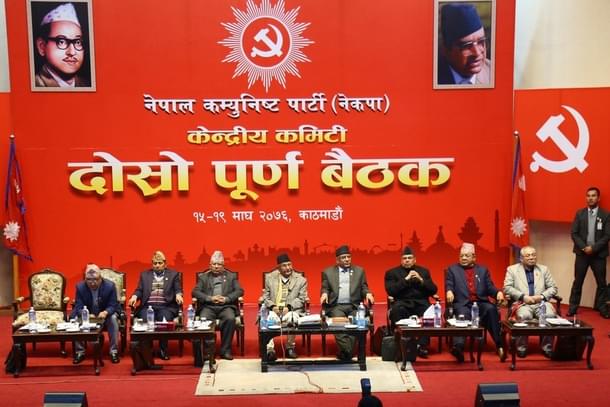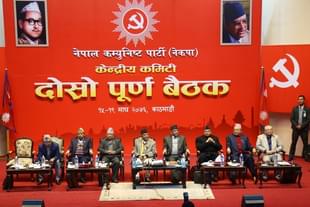World
Nepal PM Oli’s ‘Indian Hand’ Conspiracy Theory Widely Criticised And Rubbished, Even By His Own Party
Jaideep Mazumdar
Jun 30, 2020, 05:56 PM | Updated 05:56 PM IST
Save & read from anywhere!
Bookmark stories for easy access on any device or the Swarajya app.


Nepal Prime Minister Khadga Prasad Sharma Oli resorted to unparalleled jingoism to stave off challenges to his post from within and outside his party. When that did not work, he indirectly blamed India for backing moves to unseat him.
But this tactic, too, seems to be backfiring.
Oli has come in for stringent criticism from his own party leaders, as well as the opposition, political analysts and retired diplomats in Nepal after his shocking statement on Sunday (28 June).
Leaders of the Nepal Communist Party (NCP) who are leading the chorus against Oli’s high-handed style of functioning and mis-governance are incensed and aghast at the Prime Minister’s suggestion that they are acting at India’s behest.
In what is being interpreted as unprecedented criticism of his own prime minister, Nepal’s foreign minister Pradeep Gyawali told Parliament on Monday: “All the stakeholders should make contributions in building a positive tone in (bilateral) relations. No one should spread bitterness in the relationship. I urge all to make positive contributions.”
This report in The Kathmandu Post quotes observers as saying that Oli’s recent statements alluding to an Indian conspiracy to unseat him have breached diplomatic decorum and are likely to further damage relations.
The report quotes an NCP Secretariat member as saying: “We are headed towards a diplomatic disaster. If India issues a statement asking for concrete evidence that the Indian ambassador is manoeuvring in Nepal’s internal politics to unseat Oli, we will have to prove it or face the consequences”.
The newspaper, a widely respected one, says that Oli’s comments alleging an Indian conspiracy to unseat him were “inflammatory” and could exacerbate problems with India.
It quotes Nepal’s renowned foreign affairs analyst Sridhar Khatri as saying: “As prime minister, he should use each and every word carefully, especially in public. This is not a good attempt to start dialogue with India. It looks like we are trying to confront India, which we are not”.
Former foreign minister and Rastriya Prajatantra Party (RPP) Leader Prakash Chandra Lohani said that Oli’s suggestion that all those who are opposing him are doing so at India’s behest smacks of arrogance and amounts to “disrespecting the people of Nepal”.
The Himalayan Times, another widely-circulated and reputable daily of Nepal, has also carried reports stating that Oli’s comments will “seriously impair” ties with India. It quotes Nepal’s former ambassador to Denmark, Vijay Kant Karna, as saying that “the language that the PM used against the Indian government was not the kind of language that a country uses against a friendly neighbour”.
Karna added that the PM’s allegation against India didn’t augur well for bilateral relations which were already strained due to the border dispute.
The ex-ambassador told The Himalayan Times: “If we cannot hold dialogue with India to enhance cooperation in other areas, such as trade, transit, security and river management, then that will be a disadvantage for both of us...the PM’s latest remarks against India are consistent with his conscious effort to talk ill of India and appease China”.
“The PM wants to appease a section of society that equates India-bashing with nationalism. This was the only reason the prime minister had said that coronavirus coming from India was more lethal than the strain of virus coming from China or Italy,” Karna added. “The PM has been provoking India and is going out of the way to appease China, violating the principles of nonalignment that Nepal adheres to,” he said.
The newspaper also quoted Nepal’s former permanent representative to the United Nations Dinesh Bhattarai as asserting that the PM had “overstepped diplomatic norms by accusing the entire Indian machinery of conspiring to remove him from power”. “We have border disputes with India but that does not mean that the PM, whose word is final on diplomatic issues, should make such inflammatory remarks against a neighbour,” said Bhattarai.
Bhattarai added that the PM’s remarks could impair Nepal-India relations in the long run. He said the PM’s remarks proved Indian media’s charges of jingoism against the PM to be true.
Nepal’s former speaker Daman Nath Dhungana termed Oli’s remarks against India as “unceremonious”. “We may have issues with our neighbours, but we cannot use such language to oppose our neighbours,” Dhungana said, adding: “Although we should treat both our neighbours equally, we cannot forget the fact that we have more interactions, as well as dependency for certain things, on India”.
Dhungana was reported as surmising that Oli was playing the ‘India card’ to cling to power as he had failed on the governance front.
Senior journalist Kanak Mani Dixit tweeted: “PM KP Oli must be mindful of the need for verbal de-escalation with India, and of how his words will be carried, relayed and interpreted. This is essential from him for the sake of de-escalation on ground at Lipu Lek and mending the overall bilateral Nepal-India relationship.”
Foreign affairs analyst Khatri said that Nepal had border disputes with China as well, but chose to remain silent on that and raise the pitch on disputes with India. Nepal should have displayed diplomatic maturity, he opined.
“Passage of the constitution amendment bill by both houses was enough to give India the message of Nepal’s political resolve and national unity, but after the bill was passed by both houses, the government should not have proceeded to get it confirmed by the president. That would have given Nepal a chance to have dialogue with India,” Khatri said.
He added: “Dialogue is often held for compromise. But with the constitution already amended to include Limpiyadhura, Lipulekh and Kalapani in Nepal’s emblem, there is no room for dialogue.”
Politicians, diplomats and analysts agreed with Khatri and said that by amending the constitution, Nepal had closed the doors for dialogue with India. And Oli’s comments had only served to firmly bolt those doors, they said.
Most of them also agreed that playing the ‘India card’ will not help Oli to stay on in power. Dissidence against him within the NCP, and disillusionment with his style of governance among the people of Nepal, is too deep and intense for such “shallow tactics” (in ex-Speaker Dhungana’s words) to bear fruit.
Jaideep Mazumdar is an associate editor at Swarajya.





